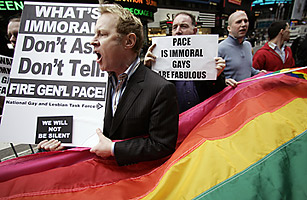Enforcing " Don't Ask, Don't Tell" : Don't Bother
-

Members of ACT UP demonstrate against the Defense Department's "Don't ask, don't tell" policy in front of a recruitment center in Times Square, New York City
The Pentagon took a giant step toward integrating openly gay men and women into the U.S. military on Thursday. No, it didn't repeal 1993's "Don't ask, don't tell" law — only Congress can do that. But it did something that could be almost as important: it eased the enforcement of that law by loosening the regulations that have been used to snare 13,500 gays — and boot them out of uniform — since 1994. "These changes will allow us to execute the law in a fair and more appropriate manner," Defense Secretary Robert Gates said. The revised regs "provide a greater measure of common sense and common decency to a process for handling what are difficult and complex issues for all involved."
The new rules require a senior officer — a general or admiral — to approve the ouster of a serviceman or -woman for being gay. That's at least one rank higher than earlier mandated, and is likely to cut down on the number of such cases. Hearsay will no longer be allowed, and statements about a military member's sexual orientation will have to be given under oath. Furthermore, information given to lawyers, clergy or medical professionals — or in connection with domestic violence — can't be used to oust someone. (See a brief history of gays in the military.)
It's Act 2 in the Obama Administration's three-act drama to keep the President's campaign pledge to lift the ban. The first act came last month when Admiral Mike Mullen, Chairman of the Joint Chiefs, told Congress he had no problem with gays in uniform. With Mullen's backing, Gates on Thursday took the next step by relaxing enforcement of the ban. The final act — getting Congress to repeal the law — is months, if not years, away.
Elaine Donnelly, head of the nonprofit Center for Military Readiness, a conservative group, predicted Congress will stick with the ban. "I remain confident that members of Congress ultimately will retain current law," she said, "which is important to protect recruiting, retention and readiness in the all-volunteer force." (From TIME's Archive: The dawn of "Don't ask, don't tell.")
But it may not matter all that much. Thursday's changes are likely to lead to far fewer soldiers, sailors, airmen and Marines being drummed out of the service for being gay or lesbian. Gates sent a clear signal that such cases should only be brought "in exceptional or extraordinary circumstances," says Aubrey Sarvis, executive director of the Servicemembers Legal Defense Network, a nonprofit group trying to end the anti-gay policy. "The White House and Pentagon have gone a long ways toward reducing discharges."
Supporters of the ban fear an exodus from the ranks if it is lifted, but anti-gay ardor has cooled since May 1993 when Senators ventured to Norfolk Navy Base to explore the cramped sleeping quarters aboard a nuclear attack submarine and assess the impact of gays serving openly. Fifteen of 17 military personnel who testified at a hearing on the base that day strongly opposed lifting the ban. While opposition today isn't as high — and the public supports doing away with the ban — it remains a sensitive political issue, as Bill Clinton painfully discovered. He simply wanted to let gays serve by changing the regulation barring them from doing so. But Congress got so upset at that prospect that it passed the compromise "Don't ask, don't tell" law, which has allowed gays to serve secretly — that's the "don't tell" part of the law. The "don't ask" portion bars the military from asking recruits if they are gay.
Feelings still run deep. Last week, a retired Marine general told the Senate Armed Services Committee that one reason the Dutch military was unable to defend 7,000 innocent Bosnian Muslims from a Serb massacre in Srebrenica in 1995 was that the Netherlands' openly gay troops weakened their military's combat resolve. Senator Carl Levin, the Michigan Democrat who chairs the panel, declared John Sheehan's claim "totally wrong." And, on Thursday, Gates and Mullen scolded Army Lieut. General Benjamin Mixon for publicly opposing the potential lifting of the ban in a recent letter to the independent Stars and Stripes military newspaper. "If those of us who are in favor of retaining the current policy do not speak up, there is no chance to retain the current policy," said Mixon, who commands Army troops in the Pacific. Mullen suggested that if Mixon doesn't agree with the possible change, he should "vote with his feet" and retire.
A Pentagon study panel is examining how the military would deal with gays if the ban is repealed, and is slated to deliver its findings to Gates by Dec. 1. The Defense chief said he would await that report before deciding if the ban should go. "There is a great deal we don't know about this [possible repeal] in terms of the views of our service members, in terms of the views of their families and influencers," Gates said. Congress, in turn, is likely to delay any action on a repeal until that report is finished. That means the next eight months — and how those in uniform react to Gates' changes, which take effect immediately — are likely to play a key role in the ultimate fate of "Don't ask, don't tell."